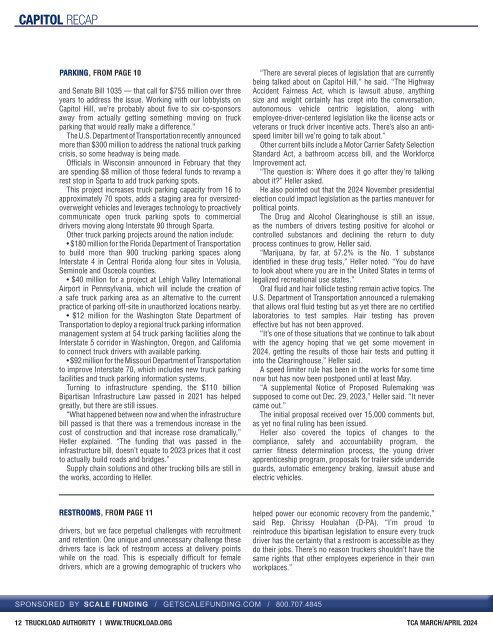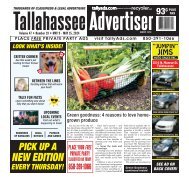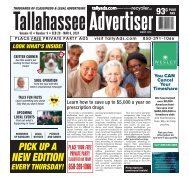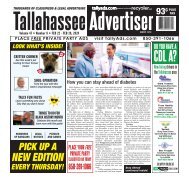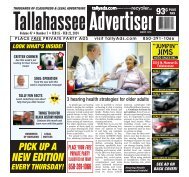TLA65_AllPages
You also want an ePaper? Increase the reach of your titles
YUMPU automatically turns print PDFs into web optimized ePapers that Google loves.
CAPITOL recap<br />
PARKING, FROM PAGE 10<br />
and Senate Bill 1035 — that call for $755 million over three<br />
years to address the issue. Working with our lobbyists on<br />
Capitol Hill, we’re probably about five to six co-sponsors<br />
away from actually getting something moving on truck<br />
parking that would really make a difference.”<br />
The U.S. Department of Transportation recently announced<br />
more than $300 million to address the national truck parking<br />
crisis, so some headway is being made.<br />
Officials in Wisconsin announced in February that they<br />
are spending $8 million of those federal funds to revamp a<br />
rest stop in Sparta to add truck parking spots.<br />
This project increases truck parking capacity from 16 to<br />
approximately 70 spots, adds a staging area for oversizedoverweight<br />
vehicles and leverages technology to proactively<br />
communicate open truck parking spots to commercial<br />
drivers moving along Interstate 90 through Sparta.<br />
Other truck parking projects around the nation include:<br />
• $180 million for the Florida Department of Transportation<br />
to build more than 900 trucking parking spaces along<br />
Interstate 4 in Central Florida along four sites in Volusia,<br />
Seminole and Osceola counties.<br />
• $40 million for a project at Lehigh Valley International<br />
Airport in Pennsylvania, which will include the creation of<br />
a safe truck parking area as an alternative to the current<br />
practice of parking off-site in unauthorized locations nearby.<br />
• $12 million for the Washington State Department of<br />
Transportation to deploy a regional truck parking information<br />
management system at 54 truck parking facilities along the<br />
Interstate 5 corridor in Washington, Oregon, and California<br />
to connect truck drivers with available parking.<br />
• $92 million for the Missouri Department of Transportation<br />
to improve Interstate 70, which includes new truck parking<br />
facilities and truck parking information systems.<br />
Turning to infrastructure spending, the $110 billion<br />
Bipartisan Infrastructure Law passed in 2021 has helped<br />
greatly, but there are still issues.<br />
“What happened between now and when the infrastructure<br />
bill passed is that there was a tremendous increase in the<br />
cost of construction and that increase rose dramatically,”<br />
Heller explained. “The funding that was passed in the<br />
infrastructure bill, doesn’t equate to 2023 prices that it cost<br />
to actually build roads and bridges.”<br />
Supply chain solutions and other trucking bills are still in<br />
the works, according to Heller.<br />
“There are several pieces of legislation that are currently<br />
being talked about on Capitol Hill,” he said. “The Highway<br />
Accident Fairness Act, which is lawsuit abuse, anything<br />
size and weight certainly has crept into the conversation,<br />
autonomous vehicle centric legislation, along with<br />
employee-driver-centered legislation like the license acts or<br />
veterans or truck driver incentive acts. There’s also an antispeed<br />
limiter bill we’re going to talk about.”<br />
Other current bills include a Motor Carrier Safety Selection<br />
Standard Act, a bathroom access bill, and the Workforce<br />
Improvement act.<br />
“The question is: Where does it go after they’re talking<br />
about it?” Heller asked.<br />
He also pointed out that the 2024 November presidential<br />
election could impact legislation as the parties maneuver for<br />
political points.<br />
The Drug and Alcohol Clearinghouse is still an issue,<br />
as the numbers of drivers testing positive for alcohol or<br />
controlled substances and declining the return to duty<br />
process continues to grow, Heller said.<br />
“Marijuana, by far, at 57.2% is the No. 1 substance<br />
identified in these drug tests,” Heller noted. “You do have<br />
to look about where you are in the United States in terms of<br />
legalized recreational use states.”<br />
Oral fluid and hair follicle testing remain active topics. The<br />
U.S. Department of Transportation announced a rulemaking<br />
that allows oral fluid testing but as yet there are no certified<br />
laboratories to test samples. Hair testing has proven<br />
effective but has not been approved.<br />
“It’s one of those situations that we continue to talk about<br />
with the agency hoping that we get some movement in<br />
2024, getting the results of those hair tests and putting it<br />
into the Clearinghouse,” Heller said.<br />
A speed limiter rule has been in the works for some time<br />
now but has now been postponed until at least May.<br />
“A supplemental Notice of Proposed Rulemaking was<br />
supposed to come out Dec. 29, 2023,” Heller said. “It never<br />
came out.”<br />
The initial proposal received over 15,000 comments but,<br />
as yet no final ruling has been issued.<br />
Heller also covered the topics of changes to the<br />
compliance, safety and accountability program, the<br />
carrier fitness determination process, the young driver<br />
apprenticeship program, proposals for trailer side underride<br />
guards, automatic emergency braking, lawsuit abuse and<br />
electric vehicles.<br />
RESTROOMS, FROM PAGE 11<br />
drivers, but we face perpetual challenges with recruitment<br />
and retention. One unique and unnecessary challenge these<br />
drivers face is lack of restroom access at delivery points<br />
while on the road. This is especially difficult for female<br />
drivers, which are a growing demographic of truckers who<br />
helped power our economic recovery from the pandemic,”<br />
said Rep. Chrissy Houlahan (D-PA). “I’m proud to<br />
reintroduce this bipartisan legislation to ensure every truck<br />
driver has the certainty that a restroom is accessible as they<br />
do their jobs. There’s no reason truckers shouldn’t have the<br />
same rights that other employees experience in their own<br />
workplaces.”<br />
Sponsored by SCALE FUNDING / GETSCALEFUNDING.com / 800.707.4845<br />
12 Truckload Authority | www.Truckload.org TCA MARCH/APRIL 2024


